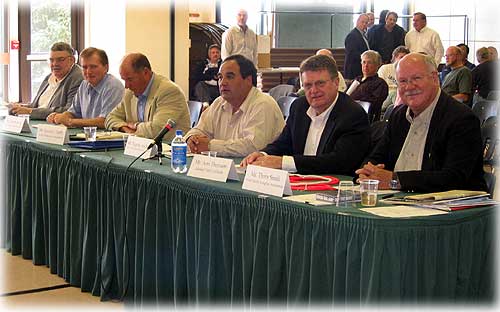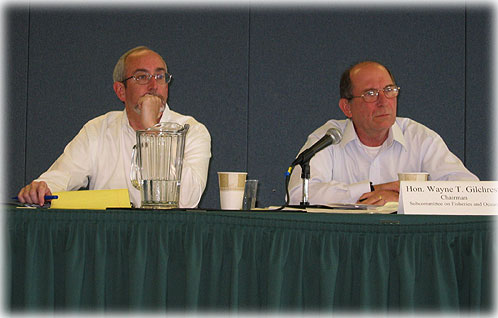 Alaska is the model in how to manage a fishery By Laine Welch July 18, 2005
That was the predominant feeling shared by Representative Wayne Gilchrest (R- Maryland) shortly after hearings last week in Kodiak and Ketchikan held by the House Resources Subcommittee on Fisheries and Oceans. Information from the hearings will be used to shape the law that governs our nation's fisheries- the Magnuson-Stevens Act (MSA), which is being reauthorized by Congress this year. The law applies to fisheries from three to 200 miles from shore.  Photo credit: Laine Welch
A rogue fog bank that appeared out of nowhere during a long run of sunny skies kept Rep. Don Young (R-Alaska) away from the Kodiak hearing, leaving the proceedings entirely in Gilchrest's lap. He was clearly up to the task, and impressed the crowd of about 100 people with his knowledge of fisheries issues and his sensitivity towards small communities. Carolyn Floyd, mayor of the City of Kodiak, set the stage by cautioning that the trend towards rationalization (limiting entry to fisheries through the use of quota shares) can change traditional landing patterns and restrain competition. "While it may benefit harvesters and consumers, it may have a severe impact on communities. It creates fishing privileges in terms of winners and losers," she said. Floyd also expressed deep concerns that upcoming generations of fishermen are not being considered, and that the new quota based system creates barriers to new processing entries. "We need to preserve opportunities for new entries into the fisheries and healthy competition among processors," Floyd said. Duncan Fields of the Gulf of Alaska Coastal Communities Coalition urged that Congress include fishing quotas for small communities as part of the Magnuson-Stevens Act. "If current trends continue, some of these unique and irreplaceable places will no longer exist. Significant steps must be taken immediately. We implore you to help save Alaska's small communities and not relegate them to the dust bin of history," Fields said. Rep. Gilchrest reassured the audience that he also comes from a small, coastal community in Maryland that regards growth and change as something that disrupts an economy they've had for 300 years. "Can a rationalized program be flexible enough to include everyone and not 'gentrify' the fisheries?" he asked. "I think it can with periodic reviews of good socio- economic data," said Stephanie Madsen, who chairs the North Pacific Fishery Management Council (NPFMC). Sue Salveson of the National Marine Fisheries Service Sustainable Fisheries Division agreed, adding that rationalization "provides benefits in terms of conservation and management," and that "any national guidelines should provide flexibility to allow for specific needs." "Alaska is on the right track. Restructuring (through rationalization) is necessary to maintain the state's competitive position in global seafood markets," said Arni Thomson, director of the Alaska Crab Coalition. He also pointed out that Bering Sea coastal communities are major beneficiaries by receiving 10 percent of the catch quotas in all fisheries, combined with extensive investment in crab and other vessels. Speaking of being on track, Julie Bonney of the Alaska Groundfish Data Bank said there are two mind sets about rationalization programs. "Those who don't want it say they will stand in front of the train. Well, the train has left the station so people better put their luggage on board so when it gets there, they'll have all the things they need," she said.  At left, Legislative Aide Dave Whaley; At right, Rep. Wayne Gilchrest Photo credit: Arni Thomson
The need for more research dollars was echoed by many witnesses at the Kodiak hearing. "Science is the most critical piece and yet it is the most under funded. Increased research is the key to improving fisheries management," said Jerome Selby, mayor of the Kodiak Island Borough. Selby added that more federal scientists should be based in Kodiak instead of Seattle in order to directly interact with the industry. All witnesses also agreed that the MSA should not include statutes for ecosystem management, as it will "set up the nation's eight regional councils for litigation." "Do you recommend any change in the make up of the fishery management councils?" Rep. Gilchrest asked as the final question of the four hour hearing. "When it comes down to a clear issue of conservation vs. pocketbooks, time and time again I have seen industry members on the North Pacific council vote to not raise catch levels. They always opt to live within the scientists' recommendations," said Dave Benton of the Marine Conservation Alliance. Kevin Duffy, director of the At-Sea Processors Association, said the MSA should require that all other councils do the same. Glenn Reed of the Pacific Seafood Processors Association agreed, adding: "Maintain the current system and insist that all stakeholders are considered and let the councils choose all the tools they need." "Not a single fishery under the North Pacific Council's purview is listed as over-fished," said Frank Kelty, resource analyst for Dutch Harbor/Unalaska. Duncan Fields perhaps perhaps summed it up best. "You can fight and keep it in the family. That's how we feel about the council. There are things we would like to see changed or improved, but not tweaked at the national level," he said. After the hearing, Rep. Gilchrest said in a phone interview: "We can't deal with every issue or disagreement. The most important thing for us is to understand how we can provide a framework upon which the councils can do their jobs and improve safety, economic viability, and use the best science to provide for fisheries that are sustainable and abundant. We want to hear every voice." Responding to criticism by fishermen that the hearings were held at a time when many were out fishing (belied by hundreds of boats in Kodiak's harbors), he explained that Congress was in full session and "we had a short window of opportunity to come to Alaska and we took it." Rep. Gilchrest said the official
record will remain open for 60 days for anyone who wants to comment.
He added that the Magnuson-Stevens Act will be reauthorized by
Congress by this time next year.
Publish A Letter on SitNews Read Letters/Opinions Submit A Letter to the Editor
|